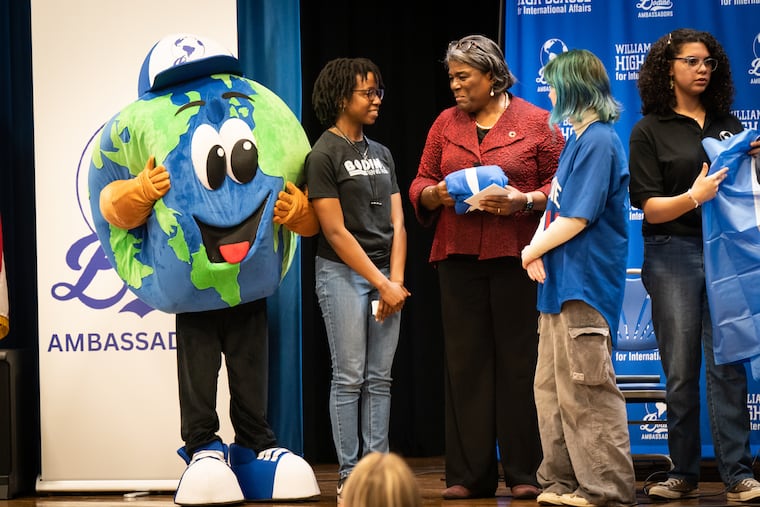The U.N. ambassador talked to Palestinian high school students in Philly who are critical of Biden on Gaza
The country’s U.N. ambassador met with Palestinian students privately, then remaining pupils at a school for international affairs.

On the same day that President Joe Biden’s administration condemned some of the campus protests around the nation, the country’s U.N. ambassador met with Palestinian students in Philadelphia and encouraged them and their classmates to make their voices heard.
Linda Thomas-Greenfield spoke to students at William W. Bodine High School for International Affairs after a private meeting with six Palestinian students at the school.
“I just met with six of your classmates who gave me a very hard time on what our policies are in Gaza,” she told the students. ”And what I said to them, and I say to you, is you need to make your voices heard. And you have the opportunity with a member of President Biden’s cabinet to make your voices heard on any number of policy issues and it’s not something that young people around the world always get the opportunity to do.”
Thomas-Greenfield, in an interview with The Inquirer, said It was an “extraordinarily emotional” conversation.
“They were angry but respectful. I will say that and they had this sense that nobody is listening to them.”
The school, which is in Northern Liberties, did not make the Palestinian students available to talk to reporters.
The Biden administration on Tuesday condemned the actions of protesters at Columbia University, who took over and barricaded themselves in a building on campus early Tuesday.
“President Biden has stood against repugnant, antisemitic smears and violent rhetoric his entire life. He condemns the use of the term ‘intifada,’ as he has the other tragic and dangerous hate speech displayed in recent days,” White House Deputy Press Secretary Andrew Bates said in a statement Tuesday.
Thomas-Greenfield said if protest speech crosses into promoting violence it shouldn’t be tolerated.
“I think if you want to have your voice heard, you can’t do it through violence. You can’t do it through hatred. And we’re seeing some of that,” she told The Inquirer.
Thomas-Greenfield has herself faced protesters, most recently at Georgetown University, for three votes cast on behalf of the Biden administration against immediate cease-fires in Gaza.
After the February vote, Thomas-Greenfield said the resolution would have jeopardized negotiations to broker a deal that would release hostages in exchange for a temporary humanitarian cease-fire.
In March, the UN Security Council adopted a resolution demanding a ceasefire in Gaza, which the United States allowed to pass by abstention.
Asked in Philadelphia on Tuesday whether she was hopeful about cease-fire talks in Egypt, Thomas-Greenfield said: “We’re hearing positive noises now that a deal may be reached. I have to remain hopeful.”
Thomas-Greenfield is only the second Black woman to hold her post. She was a career diplomat for 35 years before she retired when former President Donald Trump took office in 2017. As U.N. ambassador, she’s made increasing diversity in the diplomatic corps a goal of her tenure and often visits schools and colleges.
The questions in her larger meeting with Bodine students, pre-approved by the school, were largely about Thomas-Greenfield’s biography and career in public service.
She encouraged students to consider a path in diplomacy, stressing its importance, especially in war times.
“I know as young people of color you can look at me and know that this is an option for you,” she told the students. “When we look at what’s happening around the world, we look at the death, the carnage, the suffering it’s so much easier … to pretend it’s not there. But I know because I do get up in the morning that it is going to matter to somebody and that’s why I’m able to continue to do this job.”
In an interview with The Inquirer’s editorial board Tuesday afternoon, Thomas-Greenfield also urged more focus on less-covered international crises playing out in Sudan, Darfur, Myanmar, and Ukraine.
“People have crisis fatigue and they only want to deal with one crisis at a time when the world doesn’t work like that,” she said.
“The loudest voices get the oil,” she said. “The demonstrations on school campuses, that’s the center of the reporting and I get criticized for, ‘Why are you talking about Sudan when things are happening in Gaza?’ And I’m like, ‘Why are we talking about Gaza when things are happening in Sudan?’ They both have to be given the attention that they deserve.”